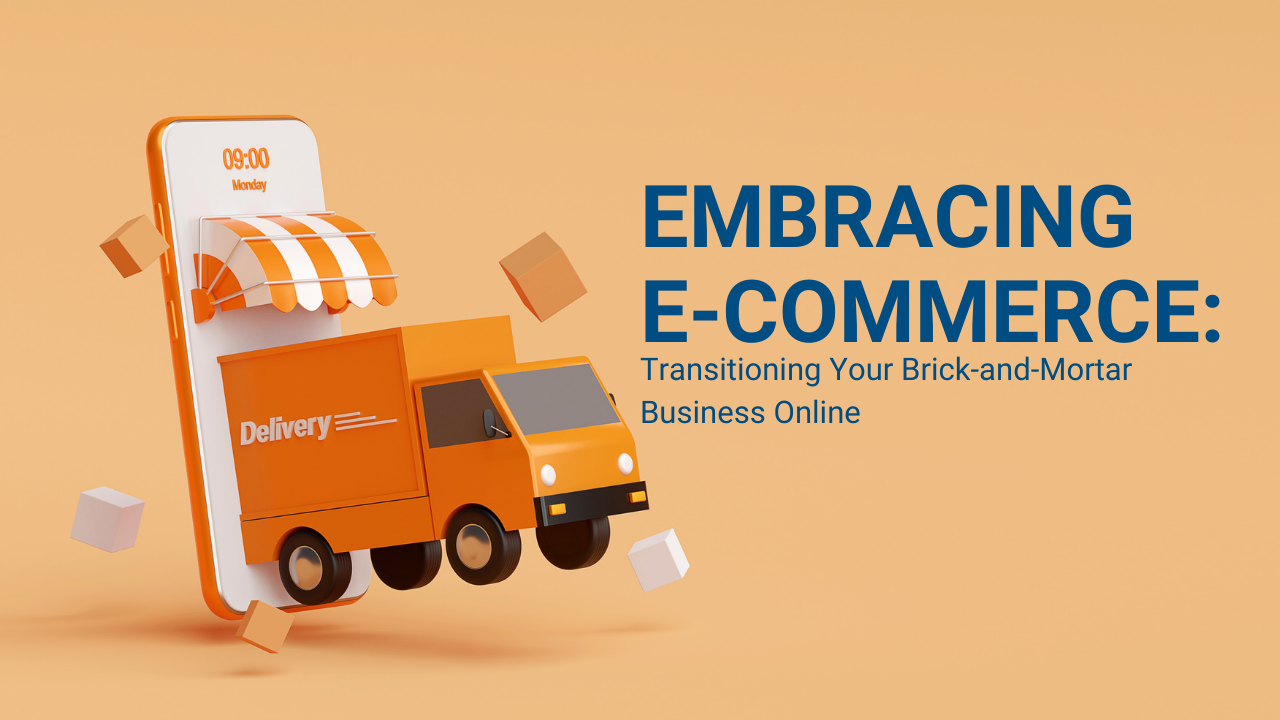Embracing E-commerce: Transitioning Your Brick-and-Mortar Business Online

Want to run a successful business?
Change or die.
OK, dramatics aside, there is a lot of truth in these three simple words. In a rapidly evolving world, embracing change is often necessary for businesses to thrive. Failure to acclimate will find you in the graveyard of has-beens alongside MySpace, Blockbuster, and Enron.
This holds true for any business, but brick-and-mortar operations could benefit the most from a little shake-up. More specifically, transitioning - or adding - E-commerce to their playbooks.
Obviously, there are undeniable challenges, but the advantages and opportunities are equally compelling. Here, we explore the pros and cons of taking your brick-and-mortar business online and why you might find success in unexpected ways.
The Pros of E-commerce:
- Wider Reach and Market Expansion: One of the greatest benefits of e-commerce is the ability to reach a global audience. This makes your products or services accessible to customers beyond your local community, leading to unprecedented growth potential.
- Reduced Operating Costs: Moving from a physical store to an online platform can save significant costs by reducing overhead expenses like rent, utilities, and staffing.
- 24/7 Availability: E-commerce doesn't adhere to traditional business hours. Your online store is open 24/7, making it convenient for customers to shop at any time, even if you're fast asleep. This flexibility can significantly boost your sales and revenue.
- Data-Driven Decision-Making: It sounds a bit Big-Brothery, but E-commerce platforms provide essential data and analytics to understand customer behaviors, preferences, and purchasing patterns, which can be used to optimize marketing strategies and product offerings.
- Adaptability and Convenience: The digital landscape enables businesses to quickly adapt to market changes and trends, allowing for seamless updates to website content, product listings, and customer inquiries.
The Cons of E-commerce:
- Initial Investment: Setting up an e-commerce platform requires an initial investment in website development, digital marketing, and online security. However, these costs are often outweighed by the long-term benefits.
- Competition: E-commerce is a highly competitive market with numerous businesses vying for attention. To stand out, a strategic approach to branding, marketing, and customer engagement is necessary.
- Lack of Physical Interaction: Transitioning to online commerce requires building trust and strong customer relationships in a virtual setting, which can be challenging without face-to-face interactions that often define brick-and-mortar businesses.
The Case for Keeping Brick-and-Mortar
Although transitioning to e-commerce can be a game-changer, there are instances where maintaining a brick-and-mortar presence is still necessary for businesses.
- Local Loyalty: A physical store is great for businesses with a solid local following. It allows them to build personal connections and customer trust, increasing loyalty and business growth.
- Hands-On Experience: Trying out products like clothes, cars, and food is crucial for determining quality. Online experiences cannot replace face-to-face interaction, making physical locations essential for decision-making.
- Brand Presence: A physical store can contribute to your brand's authenticity and visibility, creating a stronger overall presence in the market.
The Case for Adding E-commerce
Don't think your business is a good fit for E-commerce? Here are a few things to consider first:
- Unique Niche Markets: The internet allows for (and celebrates!) niche products or services to flourish. No matter how specialized your offerings may be, there's likely an online community looking for what you provide.
- Hybrid Models: You don't have to abandon your brick-and-mortar store entirely. Many businesses successfully combine physical locations with e-commerce, offering their customers the best of both worlds.
- Agility and Innovation: E-commerce fosters innovation. As you adapt to an online environment, you might discover new ways to engage with your audience and create unique selling points for your brand.
Final Thoughts:
The decision to shift your brick-and-mortar business to E-commerce is one that requires careful consideration. Even though it may come with some challenges, the potential for growth, reduced expenses, and flexibility in the online realm are compelling reasons to contemplate this move. Whether you decide to fully embrace e-commerce or maintain a physical store alongside your digital presence, it is crucial to evaluate your unique circumstances, market, and customer base to determine the best path forward. Adopting E-commerce can be a powerful strategy for expanding your business and securing its future in a constantly changing business environment.



